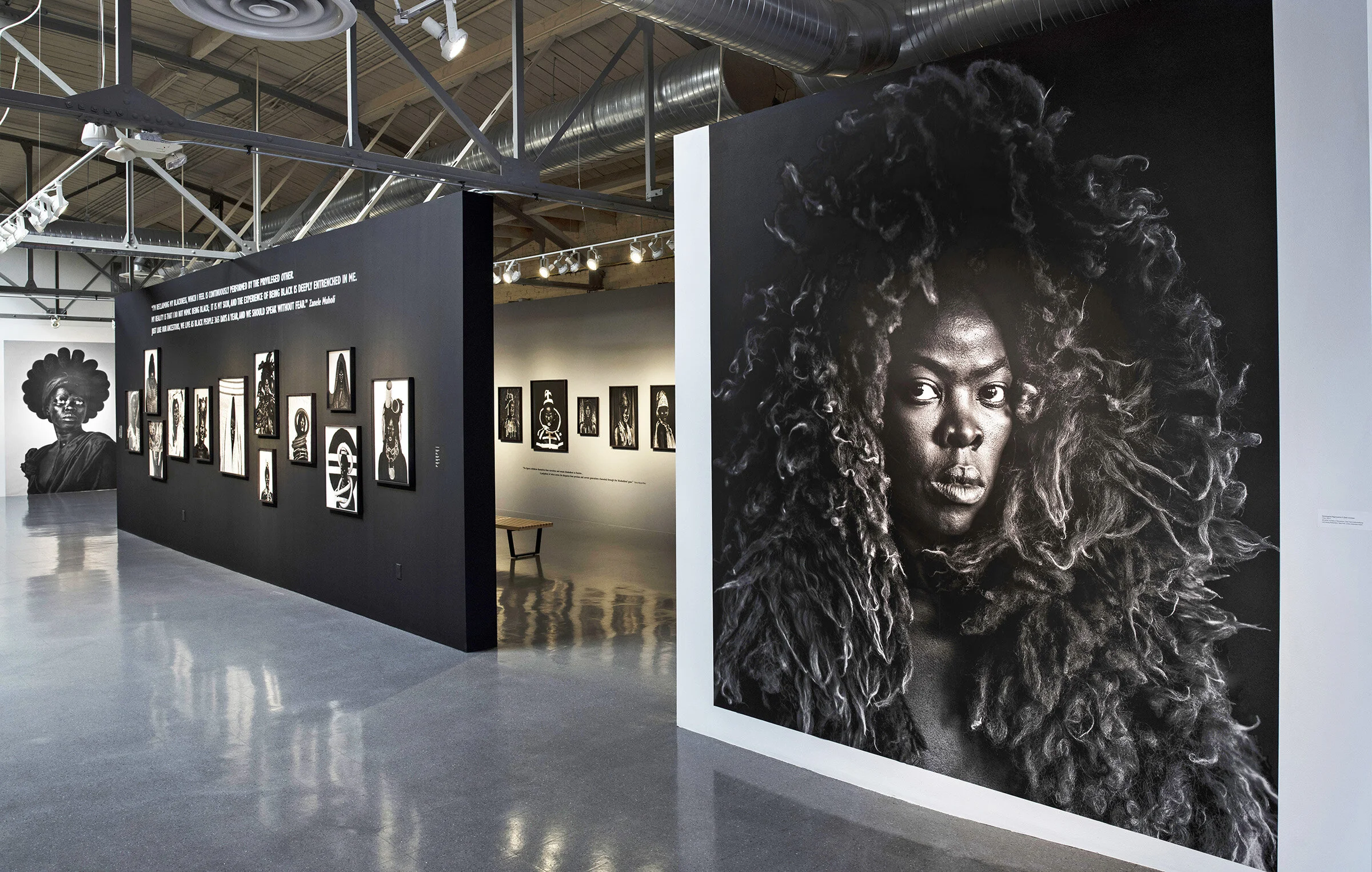Black in Denver
Narkita Gold: Black in Denver
History Colorado Center
1200 N. Broadway, Denver, CO 80203
March 5, 2021-March 5, 2022
Admission: Adults: $14, Seniors (65+): $12, Students (16-22 with valid student ID): $10, Children (5-15): $8, Children 4 and under & Members: free
Review by Danielle Cunningham
As the title implies, Narkita Gold’s first professional body of work focuses on Denver’s Black community, primarily female. The artist pairs colorful photographic portraits with interviews in order to prioritize individual experiences while also highlighting the sometimes overlooked fact that Black people have always lived in Denver. Though there are a few well-known faces in the row of images, most of the women featured are ordinary Denverites. They are relatable, yet Gold elevates them to near-celebrity status by using a style of portraiture with an aristocratic presentation, revealing only the top half of the subject’s body and focusing on their face.
An installation view of Narkita Gold’s exhibition Black in Denver at the History Colorado Center in downtown Denver. Image courtesy of History Colorado.
The exhibition statement calls the work a “visual ethnography,” emphasizing the importance of both looking at and documenting small groups such as this one. Yet unlike most historic ethnographies of Black, African, and African-American individuals, which were founded on racist, pseudoscientific theories, Gold’s is comprised of personal anecdotes funneled through the lens of her own experience as a Black woman. That these stories are held in a history museum is poignant not only because they reflect both history and art, but also because museums are the historic site of countless inaccurate depictions of Black people and other races. As a result, Gold’s work displaces that racist history, replacing it with a charming depiction of interesting stories reflective of a unique community. Plus, Gold approaches the subject of discrimination tenderly, presenting a subset of Denver’s Black female community—in their own voices—to insiders and outsiders alike. In this way, every viewer has the opportunity to see similarities and develop empathy.
Narkita Gold, Beverly, 2020, archival digital print, 3 x 4 feet. Image courtesy of the artist.
One of Gold’s subjects, Beverly, acknowledges the importance of actively creating community as she responds to Gold’s question: “What does it mean to be Black in Denver?” Like many of the individuals pictured, her expression is kind and inviting, as are her words. Using the term “community weaver,” she mentions finding people with similar expertise with whom to generate mutual exchange. Community, as she observes, breeds connection, which Gold demonstrates not only in her exhibition theme but also in her decision to position her subjects in front of bright colors and repeat the portraits by color. Each person is an individual, unified via their membership in a specific community.
Narkita Gold, LeeLee, 2019, archival digital print, 3 x 4 feet. Image courtesy of the artist.
Another subject, LeeLee, poses with her hand alongside her cheek and gazes softly at the viewer. She speaks to community diversity and the way cultivating identity resists the notion that Black culture is homogeneous. She says: “I feel joy in being myself,” and “Disrupting people’s bullshit is positive. I don’t care if it frustrates you because if it does, you have a problem to work out.” More openly rebellious than Gold’s soft nudges, her point isn’t any less meaningful and highlights the importance of causing a stir sometimes. Art photography in a history museum could be seen as a similarly positive disruption, shaking up a centuries-old paradigm to draw in new audiences.
An installation view of Narkita Gold’s exhibition Black in Denver at the History Colorado Center. Image courtesy of History Colorado.
With this exhibition, Gold starts an important conversation with museum-goers, urging them to consider Denver’s diversity, the importance of women to communities, and the boundaries of a history museum. The women pictured are a living history, but their experiences are significant to Denver’s past, present, and future landscapes. Gold also gently though undoubtedly forces visitors to question themselves and their place in the world—an impressive feat for an emerging artist.
Danielle Cunningham is an artist, scholar, and independent curator living in Denver, Colorado. She writes from a critical theoretical perspective on topics including science fiction, gender, sexuality, and disability, with an emphasis on mental illness. Dani has curated numerous group exhibitions and is the co-founder of chant cooperative—an artist co-op in Denver. She holds a Master’s Degree in Art History and Museum Studies from the University of Denver.











